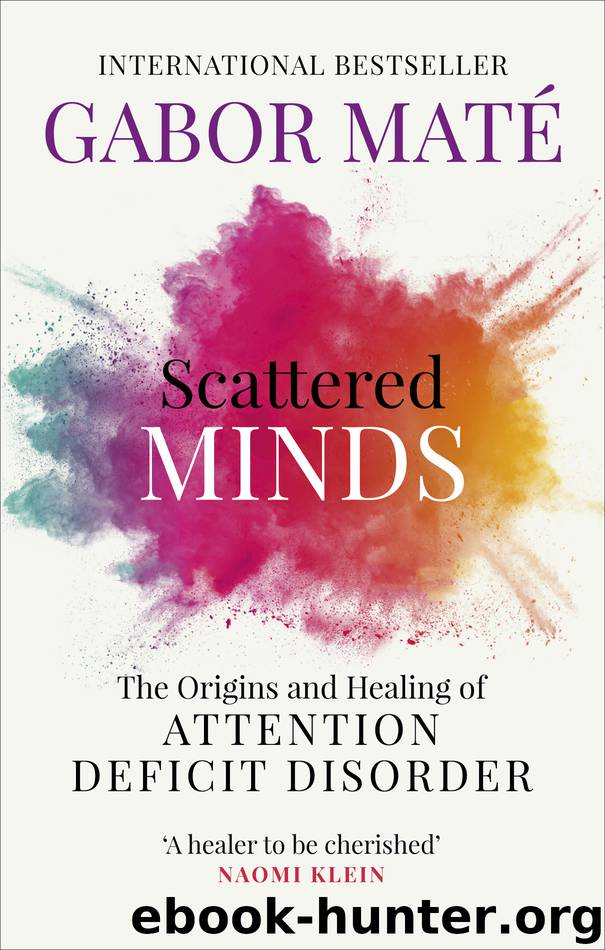Scattered Minds by Gabor Maté

Author:Gabor Maté
Language: eng
Format: epub
Publisher: Ebury Publishing
Myth 2: The child is deliberately trying to annoy the adult
“He is out to get a rise out of me, I swear to God,” a father asserted of his ten-year-old son. Many parents find such motives to be a convincing explanation for their child’s distressing behavior. On the face of it, this is a seemingly reasonable conclusion to arrive at: given the intelligence of many ADD children and the number of times they have been told not to do this or that, it may seem like they are misbehaving knowingly and on purpose. Fortunately, the assumption is wrong: these children are neither so cunning nor so malevolent. It is a mistake many of us make in our relationships with others, whether children or spouses, acquaintances or strangers, to imagine that we know the intentions behind the actions of others. Some psychologists refer to this misbelief as “intentional thinking.”
The family therapist David Freeman once concluded a public lecture on intimacy and relationships by saying that if there was any one thing he hoped his audience would remember from his talk, it was the awareness that one does not know his or her spouse, his or her children. We may believe we have a perfect idea of why they act as they do, when in reality our beliefs reflect no more than our own anxieties. Whenever we ascribe a motive to the other person, as in “you are doing this because…,” we discard curiosity and immobilize compassion. The person who knows has nothing to learn, has given up on learning. “In the beginner’s mind there are many possibilities, in the expert’s mind there are few,” said the Zen master Shunryu Suzuki. It is good to be aware that we are beginners as we approach the ADD child.
In our interactions with children, intentional thinking gets in the way of seeing the child for who he really is. Worse, the judgments we deliver on our children become the self-judgments they will carry into adult life. “I was a bad kid,” or “I was always trying to cause some trouble” frequently express the way adults with ADD recall themselves as children. The child sooner or later comes to see himself, as much as he may protest against it, through the negative opinion of the parent.
A dysfunctional search for attention underlies some of the behaviors of the ADD child, as we have just seen. Poor self-regulation, poor impulse control are also responsible for many behaviors, as are unconscious shame or rage or anxiety. All these are expressions of vulnerability and pain, not of bad intent. And even if, on a given occasion, there is consciously harmful intent, we still need to maintain the spirit of compassionate curiosity. “Why would a child want to do harm?” asked without prejudgment is a question that can provide fertile ground for inquiry. What happened to this child to make her this way? What is happening now in her life to make her act it out? There is much we can find out if we know that we don’t know.
Download
This site does not store any files on its server. We only index and link to content provided by other sites. Please contact the content providers to delete copyright contents if any and email us, we'll remove relevant links or contents immediately.
| Allergies | Asthma |
| Autism & Asperger's Syndrome | Cystic Fibrosis |
| Down Syndrome | Eating Disorders |
| Epilepsy | Learning Disorders |
| Lice | Special Needs Children |
I Capture the Castle by Dodie Smith(2038)
The Heavy by Dara-Lynn Weiss(1810)
Aspergirls by Rudy Simone(1697)
Be Different by John Elder Robison(1650)
Autism's False Prophets by Paul A. Offit(1537)
My Child's Different by Elaine Halligan(1516)
Smart but Scattered—and Stalled by Richard Guare(1501)
101 Tips for the Parents of Boys with Autism by Ken Siri(1495)
Asperger Syndrome (Autism Spectrum Disorder) and Long-Term Relationships by Ashley Stanford(1426)
What's Making Our Children Sick? by Michelle Perro(1416)
ADHD by Mark Selikowitz(1393)
Girlish by Lara Lillibridge(1387)
On Immunity: An Inoculation by Biss Eula(1361)
An Adult with an Autism Diagnosis by Gillan Drew(1354)
Nerdy, Shy, and Socially Inappropriate by Cynthia Kim(1350)
Animal-assisted Interventions for Individuals with Autism by Temple Grandin(1331)
The Cities by K.A Knight(1317)
Sarah's Child (Hqn Romance) by Linda Howard(1313)
Seeing Ezra by Kerry Cohen(1305)
